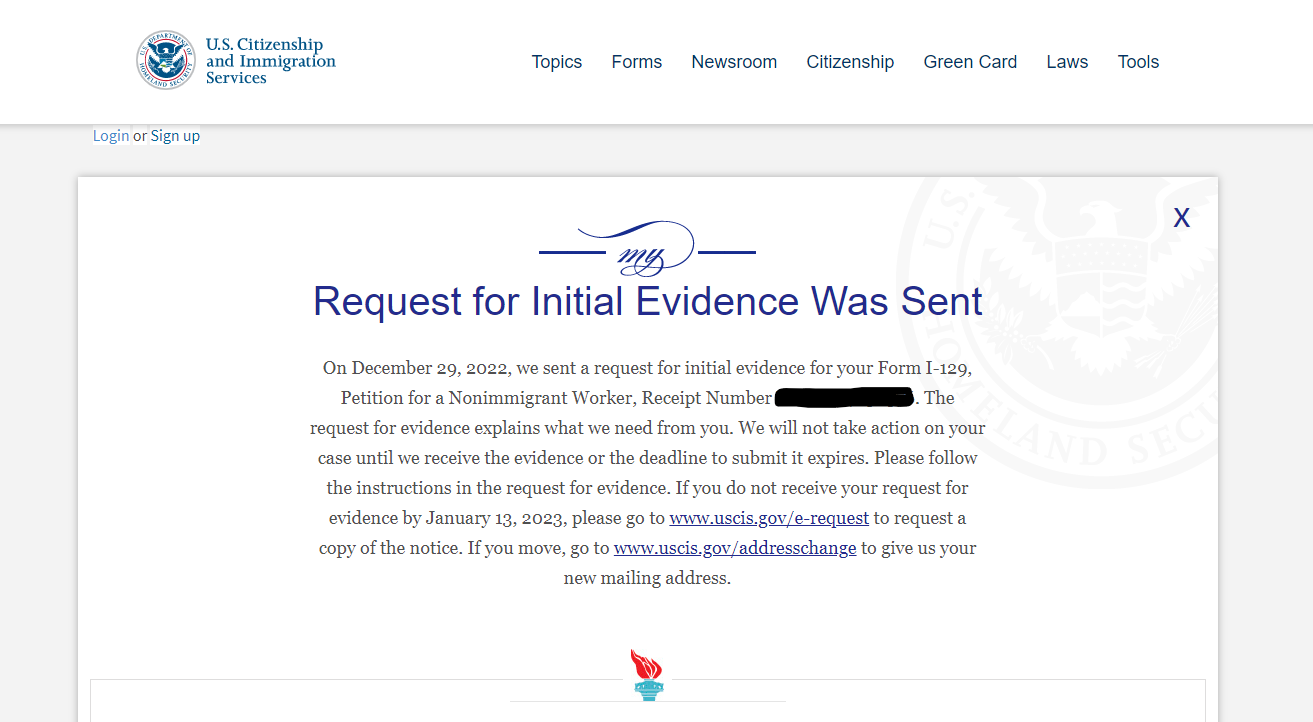What is a Request for Evidence?
April Perez • Jan 19, 2023

The most important thing to understand is that it is not a denial. A request for evidence can be issued for any type of petition that is filed with USCIS. The request for evidence is usually issued by the reviewing officer if a specific document is missing or if the officer does not believe that the evidence provided is sufficient to meet the requirements for the petition to be approved.
In the case of P1A visas for athletes, O visas, or EB1 visas an officer may state that more than one requirement requires additional evidence. The additional evidence being requested will vary since each officer will view the evidence through their own interpretation of the requirements. The additional evidence being submitted in response to the request for evidence must be submitted with a cover letter addressing the deficiencies that were pointed out by the officer, and the evidence provided must be submitted with the response cover letter as exhibits. Examples of possible additional evidence may be more background information on awards or prizes that the individual received, or additional information on past or future projects, or events that the applicant has or will participate in. The most important thing is to try to provide as much of the additional evidence that the officer is requesting so that the officer gets a better understanding of the evidence being provided for the requirements.
In some instances, an officer may have overlooked an important piece of evidence or several important pieces of evidence. This is important to point out in the response, and may warrant a request for supervisory review in the response from your attorney.
It is important to provide as much additional information being requested as possible since this is the last opportunity to prove to the officer that the individual qualifies for the type of visa they are applying for.
Once the response is received by USCIS, the estimate of time for a decision to be issued if the case was submitted for premium processing goes back to 15 business days from the time the response is received. If the case was not submitted under premium processing, then the estimate of time for a decision is based on the processing times on the USCIS website.
If a request for evidence is received for your case, it is important to work closely with your attorney to try and have your case approved.
This blog is not intended to be legal advice and nothing here should be construed as establishing an attorney client relationship. Please schedule a consultation with an immigration attorney before acting on any information read here.

By Kris Quadros-Ragar
•
18 Apr, 2024
The latest policy alert, PA-2024-05, issued by the U.S. Citizenship and Immigration Services (USCIS) on March 21, 2024, brings revisions to the USCIS Policy Manual, specifically focusing on expediting requests. These updates aim to simplify and elucidate the process for applicants, particularly those facing emergencies or urgent humanitarian needs. The primary goal is to make it easier for applicants to understand how to request expedited processing for their various submissions, including applications, petitions, appeals, or motions, especially in cases concerning government interests or urgent situations. While USCIS has historically permitted immigration benefit seekers to request expedited application processing in specific circumstances, the process has frequently been perceived as unclear, with decisions made arbitrarily on a case-by-case basis. The recent update seeks to rectify this by providing clarity and uniformity to the process and establishing explicit criteria and documentation standards. In order to request expedited processing, applicants need to adhere to a more defined procedure. This involves submitting thorough documentation and illustrating the urgency or government relevance of their case. The recent update also explains how USCIS reviews these requests, offering applicants a better grasp of the process. The update introduces special measures for speeding up the processing of Form I-131 (Application for Travel Document) in emergency situations. This acknowledges the urgent need for certain applicants to travel. The policy also acknowledges that expedited requests may be evaluated if there is evident USCIS error, aiming to uphold fairness and accountability within the processing system. These changes aim to make the expedited request process more transparent and understandable for applicants and their representatives. In summary, USCIS's revision regarding expedited requests signifies a notable advancement in rendering the immigration process more transparent and attentive to applicants' requirements. By comprehending these updated guidelines, applicants and their representatives can more effectively navigate the expedited request procedure, ensuring that urgent cases receive due consideration. If you believe you qualify for expedited processing under the recent USCIS policy updates, feel free to contact our office, and we will be more than happy to assist you. FONT : https://www.uscis.gov/policy-manual/volume-1-part-a-chapter-5

By Kyle Huffman
•
11 Apr, 2024
As of April 1, 2024, USCIS has instituted an inflation adjustment to immigration application filing fees . These fee increases apply to a majority of the different application types, including family-based, non-immigrant, and immigrant petitions. As a part of these fee increases, USCIS has also instituted a new program designed to provide funding to the United States’ Asylum Program, in order to better address the massive backlog of pending asylum claims currently waiting to be adjudicated. Unfortunately, these changes have led to confusion among petitioners for when they are required to pay the Asylum Program Fee, and when they may qualify for a 50% or complete exemption from the fee. The Asylum Program Fee is required to be submitted by employers in all I-129 and I-140 petitions filed on or after April 1, 2024. The Asylum Program Fee is $600, however, certain exemptions apply . Small employers , defined as having 25 or fewer total employees, qualify for a reduction of the Asylum Program Fee, but are still required to submit a reduced fee of $300. Individual petitioners, or self-petitions, such as in the case of an EB-2 National Interest Waiver, are considered small employers for the purpose of the Asylum Program Fee and are also required to submit the reduced $300 fee. Non-profit organizations are exempted from the Asylum Program fee and are not required to submit any additional funds with the ordinary I-129 or I-140 filing fee. In addition, non-profits qualify for a 50% reduction of the ordinary filing fee in certain types of applications, bringing the overall filing fee burden down substantially for non-profit organizations. With these changes to USCIS’ filing fee schedule, USCIS is hoping for significant improvements to efficiency and processing for pending asylum applicants. If you or your petitioning organization need any assistance in preparing an application for an immigration benefit, including ensuring proper compliance with the new fee requirements, our office is ready and waiting to help!

By Denice Flores
•
04 Apr, 2024
Advance parole is a travel document that permits you to travel outside the United States for temporary travel and return to the United States . Applicants for advance parole need to file Form I-131, Application for Travel Document with U.S. Citizenship and Immigration Services (USCIS) and pay the filing fee. When the application is approved, USCIS issues the applicant a Form I-512L, the advance parole document. The document must be presented to immigration officials to seek admission into the United States after traveling abroad. There are several ways a person can qualify for and obtain advance parole. Applicants for adjustment of status, DACA recipients, and individuals who need to travel for urgent humanitarian reasons are three common types of applicants that can apply for advance parole , however there are more. Applicants for adjustment of status can apply for advance parole when they file their green card application or when the green card application is pending. Adjustment of status applicants must obtain advance parole before traveling outside the United States to avoid an issue with the green card application. Obtaining advance parole through an adjustment of status application does not require an emergency or humanitarian purpose for travel. Note, when you file for advance parole through an adjustment of status application the filing fee for Form I-131 is not required. DACA recipients may also apply for advance parole to travel abroad for humanitarian reasons or for employment or educational purposes only. Humanitarian reasons include medical attention or treatment, visiting a sick relative or for a relative’s funeral services. Educational purposes include studying abroad, academic research and more. Employment purposes include work, training, meetings, interviews, and other specific work assignments. Certain individuals may also apply for advance parole due to an urgent humanitarian reason or to further a significant public benefit. To show that the travel is due to humanitarian, education, or employment reasons, the applicant must provide proof of such to USCIS. As mentioned, these are the three most common ways to obtain advance parole, but they are not the only ways. If you have questions about other ways to obtain advance parole, if you think you qualify for advance parole or have questions about your eligibility, please schedule a consultation with one of our experienced attorneys and we will be more than happy to assist you.


